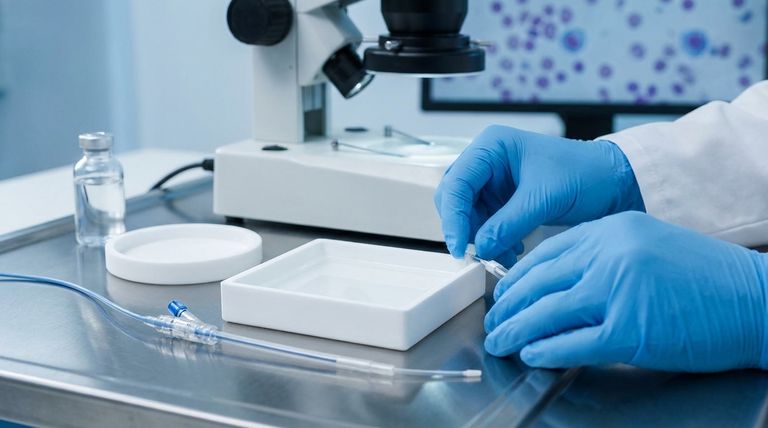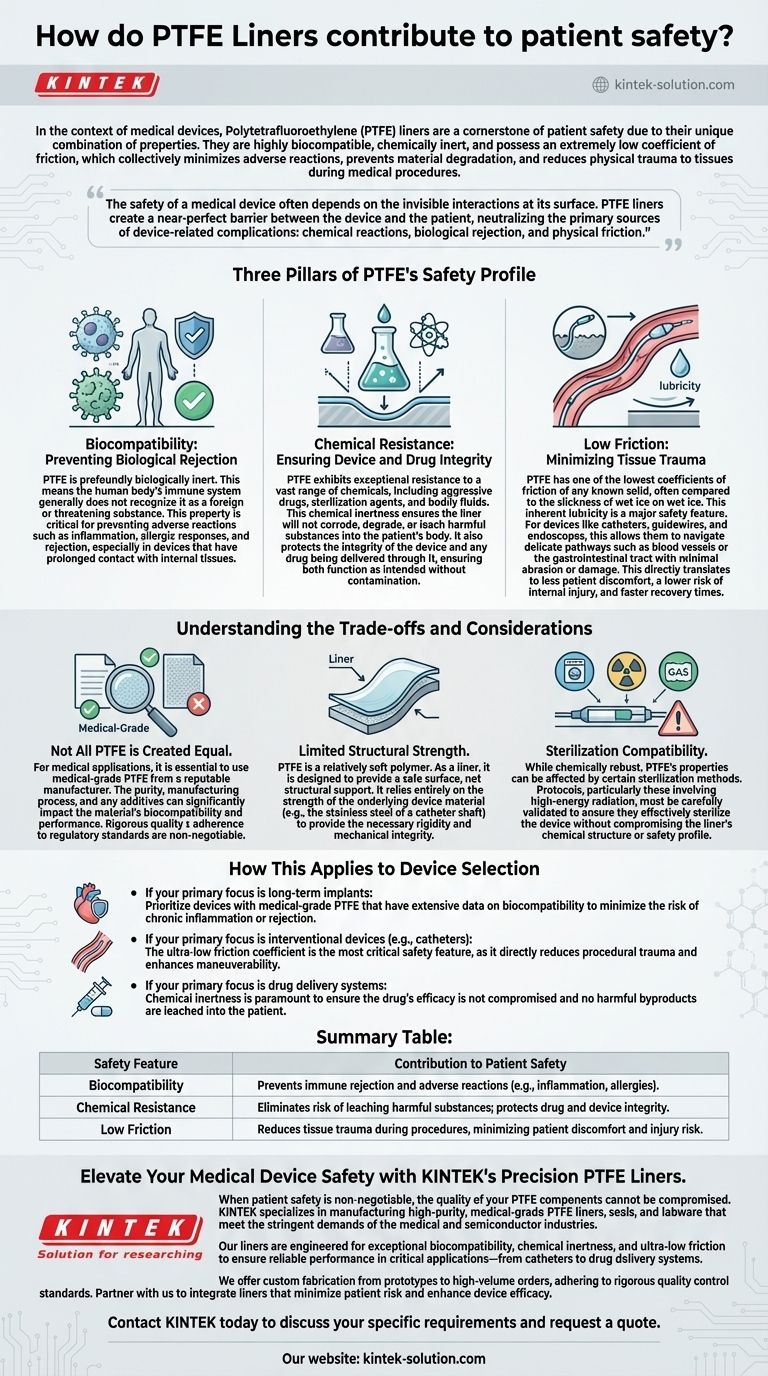In the context of medical devices, Polytetrafluoroethylene (PTFE) liners are a cornerstone of patient safety due to their unique combination of properties. They are highly biocompatible, chemically inert, and possess an extremely low coefficient of friction, which collectively minimizes adverse reactions, prevents material degradation, and reduces physical trauma to tissues during medical procedures.
The safety of a medical device often depends on the invisible interactions at its surface. PTFE liners create a near-perfect barrier between the device and the patient, neutralizing the primary sources of device-related complications: chemical reactions, biological rejection, and physical friction.

The Three Pillars of PTFE's Safety Profile
The contribution of PTFE to patient safety is not based on a single feature, but on the synergy of three core material properties. Understanding each one is key to appreciating its role in modern medicine.
Biocompatibility: Preventing Biological Rejection
PTFE is profoundly biologically inert. This means the human body's immune system generally does not recognize it as a foreign or threatening substance.
This property is critical for preventing adverse reactions such as inflammation, allergic responses, and rejection, especially in devices that have prolonged contact with internal tissues.
Chemical Resistance: Ensuring Device and Drug Integrity
PTFE exhibits exceptional resistance to a vast range of chemicals, including aggressive drugs, sterilization agents, and bodily fluids.
This chemical inertness ensures the liner will not corrode, degrade, or leach harmful substances into the patient's body. It also protects the integrity of the device and any drug being delivered through it, ensuring both function as intended without contamination.
Low Friction: Minimizing Tissue Trauma
PTFE has one of the lowest coefficients of friction of any known solid, often compared to the slickness of wet ice on wet ice. This inherent lubricity is a major safety feature.
For devices like catheters, guidewires, and endoscopes, this allows them to navigate delicate pathways such as blood vessels or the gastrointestinal tract with minimal abrasion or damage. This directly translates to less patient discomfort, a lower risk of internal injury, and faster recovery times.
Understanding the Trade-offs and Considerations
While PTFE is a superior material for these applications, a complete technical assessment requires acknowledging its limitations. Objectivity is crucial when evaluating any material for medical use.
Not All PTFE is Created Equal
The term "PTFE" can cover a range of products. For medical applications, it is essential to use medical-grade PTFE from a reputable manufacturer.
The purity, manufacturing process, and any additives can significantly impact the material's biocompatibility and performance. Rigorous quality control and adherence to regulatory standards are non-negotiable.
Limited Structural Strength
PTFE is a relatively soft polymer. As a liner, it is designed to provide a safe surface, not structural support.
It relies entirely on the strength of the underlying device material (e.g., the stainless steel of a catheter shaft) to provide the necessary rigidity and mechanical integrity.
Sterilization Compatibility
While chemically robust, PTFE's properties can be affected by certain sterilization methods.
Protocols, particularly those involving high-energy radiation, must be carefully validated to ensure they effectively sterilize the device without compromising the liner's chemical structure or safety profile.
How This Applies to Device Selection
Your evaluation of a device's safety should be guided by its intended use. The unique properties of PTFE serve different primary functions depending on the application.
- If your primary focus is long-term implants: Prioritize devices with medical-grade PTFE that have extensive data on biocompatibility to minimize the risk of chronic inflammation or rejection.
- If your primary focus is interventional devices (e.g., catheters): The ultra-low friction coefficient is the most critical safety feature, as it directly reduces procedural trauma and enhances maneuverability.
- If your primary focus is drug delivery systems: Chemical inertness is paramount to ensure the drug's efficacy is not compromised and no harmful byproducts are leached into the patient.
Understanding these core material properties allows you to critically evaluate a device's safety claims beyond the marketing material.
Summary Table:
| Safety Feature | Contribution to Patient Safety |
|---|---|
| Biocompatibility | Prevents immune rejection and adverse reactions (e.g., inflammation, allergies). |
| Chemical Resistance | Eliminates risk of leaching harmful substances; protects drug and device integrity. |
| Low Friction | Reduces tissue trauma during procedures, minimizing patient discomfort and injury risk. |
Elevate Your Medical Device Safety with KINTEK's Precision PTFE Liners
When patient safety is non-negotiable, the quality of your PTFE components cannot be compromised. KINTEK specializes in manufacturing high-purity, medical-grade PTFE liners, seals, and labware that meet the stringent demands of the medical and semiconductor industries. Our liners are engineered for exceptional biocompatibility, chemical inertness, and ultra-low friction to ensure reliable performance in critical applications—from catheters to drug delivery systems.
We offer custom fabrication from prototypes to high-volume orders, adhering to rigorous quality control standards. Partner with us to integrate liners that minimize patient risk and enhance device efficacy.
Contact KINTEK today to discuss your specific requirements and request a quote.
Visual Guide

Related Products
- Custom PTFE Parts Manufacturer for Teflon Containers and Components
- Custom PTFE Parts Manufacturer for Teflon Parts and PTFE Tweezers
- Custom PTFE Measuring Cylinders for Advanced Scientific and Industrial Applications
- Custom PTFE Sleeves and Hollow Rods for Advanced Applications
- Custom PTFE Teflon Balls for Advanced Industrial Applications
People Also Ask
- What are the primary applications of PTFE fasteners and custom parts? Critical Solutions for Extreme Environments
- What is the working temperature range of PTFE? Master Extreme Heat and Cryogenic Applications
- What are the key benefits of PTFE in custom fabrication? Unlock Performance in Extreme Conditions
- What are some common applications of machined PTFE? Leverage its Unique Properties for Demanding Applications
- What are the material advantages of machining Teflon? Unlock Unmatched Chemical & Thermal Resistance



















